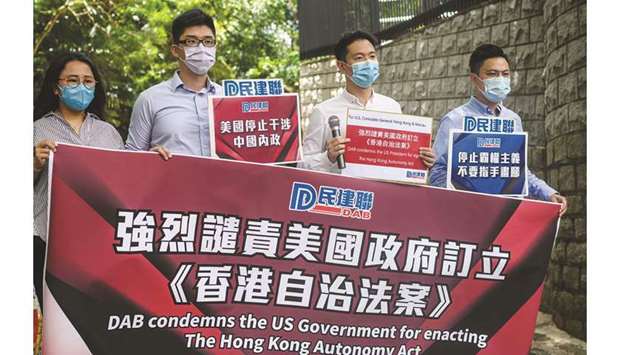Once lauded as an oasis of predictability in Asia, semi-autonomous Hong Kong has been plunged into crisis over the past year, threatening its status as a reliable world-class business centre.
As 2019 came to a close, the city was already deep in recession because of spiralling US-China trade tensions and months of huge, often violent pro-democracy protests. And the jolts to business sentiment have not let up. Late last month Beijing blanketed the city in a game-changing anti-subversion law aimed at ending protests against its increasingly authoritarian rule.
Then on Tuesday – in response to that law – Trump announced that Hong Kong would no longer have preferential trade treatment. He also signed a law that will sanction Chinese and Hong Kong officials responsible for cracking down on dissent.
While analysts and multi-nationals knew the move to strip the city of its trading privileges was coming, some were taken aback by the breadth of the executive order that followed.
“This turned out to be much more wide-ranging and less targeted than I hoped it would be – and it looks like Hong Kong will suffer as much as mainland China,” Steve Tsang, director of the SOAS China Institute in London, told AFP.
The order ends preferential treatment for Hong Kong passports, revokes licence exceptions for certain exports, suspends Washington’s extradition agreement with the city and stops any joint police training. It also terminates the Fulbright scholar exchange programme.
The sanctions against Chinese officials came from a bill passed with bipartisan support – an illustration of how Beijing’s response to Hong Kong’s protests has united Washington’s bitterly divided politics.
“Hong Kong will now be treated the same as mainland China – no special privileges, no special economic treatment and no export of sensitive technologies,” Trump said. Banks have a year-long grace period to stop doing business with Chinese officials deemed to be “primary offenders” in undermining Hong Kong’s autonomy. “We can see that banks are going through their client lists and those who are sanctioned are also expected to close accounts on their own,” Andy Kwan, director of the ACE Centre for Business and Economic Research, told AFP.
Both China and Hong Kong’s government denounced Washington’s move on Wednesday, vowing some sort of reciprocal response.
That sets the stage for American businesses in either China or Hong Kong to face counter-measures. “(US) acts are hypocritical and will certainly cause very serious damage to American companies and citizens,” Hong Kong’s government said.
While the precise impact of the new restrictions will take time to manifest, Julia Friedlander from the Atlantic Council said the latest measures “erect trade barriers and sever deeply integrated financial ties for Hong Kong with the United States”.
“This will have a devastating impact on Hong Kong as the financial gateway to Western markets and will also, by necessity, raise the profile of mainland Chinese markets for international firms and governments looking to finance global supply chains out of Asia,” she added.
The Trump administration has so far avoided the “nuclear option” that US media report had been discussed within the administration – undermining the Hong Kong dollar’s peg to the greenback. Pro-Beijing figures in Hong Kong shrugged off the ending of trade privileges. “It will only drive more Hong Kong people to rely more and more on mainland China for support for our prosperity and stability,” Regina Ip, a leading pro-Beijing lawmaker, told Bloomberg.
Last week, city leader Carrie Lam pointed to the city’s stock market as proof the business community was not worried. Since Beijing’s national security law was first publicly mooted in late May the Hang Seng index has risen more than 10%, aided by an influx of mainland investment. But it remains one of the world’s worst performers, down 11% over the past year, compared with a 2.8% gain in MSCI’s index of world stocks, according to Bloomberg News.
Given the huge international investments in Hong Kong, few are predicting a sudden capital flight. “It will take time and processes will be run before decisions will be made and implemented by multi-nationals with Hong Kong operations,” Tsang said.
But the double-whammy of Beijing’s security law and Trump’s increasingly hardline stance towards Beijing will make Hong Kong less attractive compared with cities such as Shanghai and Shenzhen, he predicted. “It must raise questions in the minds of international business people as to whether Hong Kong still offers an edge over a competitive mainland city.”

